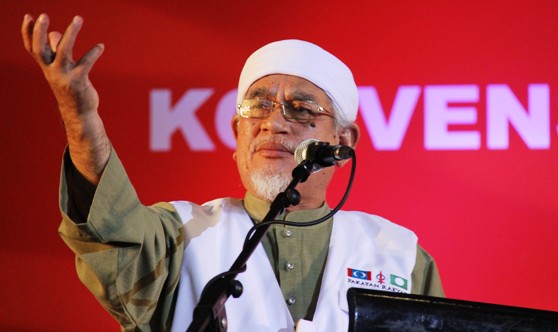Speech by Gelang Patah MP Lim Kit Siang, at the DAP kopitiam dialogue in Batu Pahat

Hadi Awang recently said that Local Council Elections could lead to another May 13, do you agree? (Pic from selangorku.com)
Thanks to Abdul Hadi Awang, Malaysians must focus on the question why there should not be local government election in Malaysia on the 50th anniversary of suspension of local council polls.
Fifty years ago, on 1st March 1965, the then Prime Minister, Tunku Abdul Rahman suspended local council election, giving as justification the threat of Indonesian Confrontation. However, he gave the solemn undertaking that “The very moment peace is declared, I can assure this House that the elections will be held”.
It is 50 years down the road and Malaysians are entitled to ask why they should continue to be denied local government election, when local government election is accepted as a basic democratic right of citizens in countries committed to a democratic way of life.
Of course, I do not agree with Hadi that local government election may lead to another May 13 race riots.
In fact, this is the first time anyone has claimed that the restoration of local government election could result in another May 13 race riots.
The causes of the May 13 race riots are still a guarded secret and this is why in my first speech in Parliament in February 1971, I had called for a Royal Commission of Inquiry to conduct a wide-ranging investigation into the causes.
I do not propose to discuss the causes of the May 13 riots but they were not caused by the 1969 General Election but by irresponsible elements who exploited the general election results for their own ends.
It is therefore a great fallacy for anyone to assert that the restoration of local government election could result in another May 13 race riots.
However, with Hadi opening the way, I will not be surprised if this will henceforth be used by reactionary Barisan Nasional leaders as an additional reason for opposing the restoration of local government elections.
Malaysians are already seeing the extraordinary spectacle of the Minister for Housing and Local Government, Abdul Rahman Dahlan springing to the support of an opposition leader – with his own twisted logic.
Many seem to have forgotten that a very vibrant local government democracy had existed in the country in the 1950s and the first half of the 1960s.
There were 373 local authorities that had well over 3,000 elected local councillors before local government elections were suspended in 1965.
A Royal Commission of Inquiry headed by Athi Nahappan was established into the workings of local government, which recommended the restoration of local government elections.
However, a law was finally passed in 1976 to abolish local government elections, and although a more efficient and accountable local government were presented as the arguments for the abolition of local government elections, the real reason was that BN leaders had no confidence of victory in the local council elections – or the lack of commitment to democracy and the principles of good governance.
It is also wrong and misguided for anyone to argue that the restoration of local government elections will benefit anyone race or on the ground that the towns are dominated by the Chinese, and that the DAP will be the main beneficiaries.
This is to ignore the process of Malay urbanisation in the 45 years since the 1969 general election.
As DAP MP for Serdang, Ong Kian Ming, has pointed out in his statement today, the ethnic composition of many of the urban councils have changed significantly since the May 13th incident in 1969. The large migration of Malays from the rural to the urban areas have made areas like Kuala Lumpur very different from today from what it was in 1969.
According to the 2010 census data, the Malay population in Wilayah Persekutuan KL (45.9%) outnumber the Chinese population (43.2%). In fact, out of the 3 city halls, 9 city councils and 37 municipal councils in Malaysia, only 6 have populations where the Chinese outnumber the Malays – Ipoh, Kuching Selatan, Johor Bahru Tengah, Pulau Pinang, Sibu and Subang Jaya!
In other words, 88% of these large urban areas have a plurality and in most cases, a majority, of Malay residents. Even in a place like Petaling Jaya, the Malay population (46.2%) outnumber the Chinese population (39.6%)!
I don’t think Kian Ming can be faulted when he concluded:
“While the Malays may be slightly under represented in the voting population in some of these urban areas because of their younger demographic profile, it is clearly wrong to say that the DAP will dominate local elections on the basis that urban areas are largely Chinese dominated. “
Fifty-eigtht years after Merdeka and 52 years after Malaysia, Malaysians should move beyond the politics of race to an inclusive politics to embrace all Malaysians, regardless of race, religion, region, age or gender .
The 2008 and 2013 general elections are proof of this politics of inclusion which unite Malaysians instead of the “divide and rule” politics of exclusion, and this is one important reason why after 50 years, local government elections should be restored to Malaysia.



